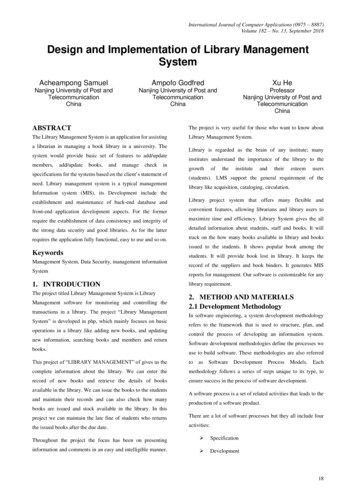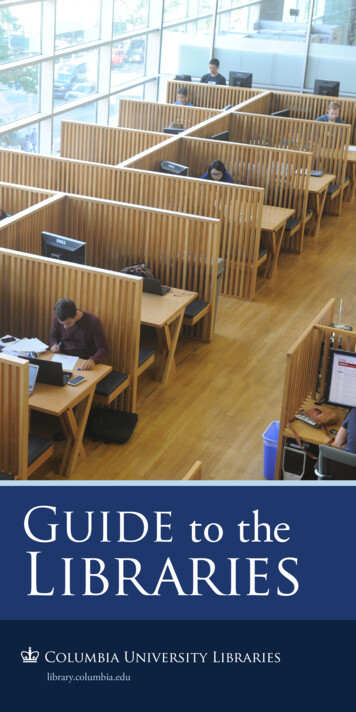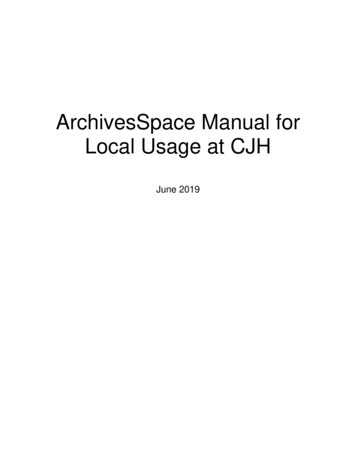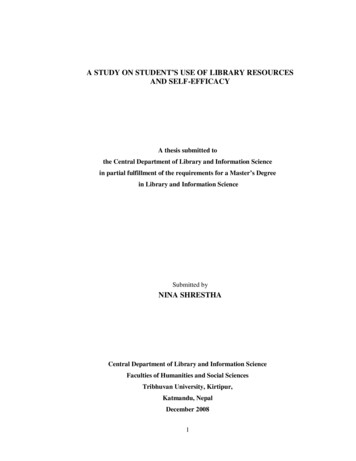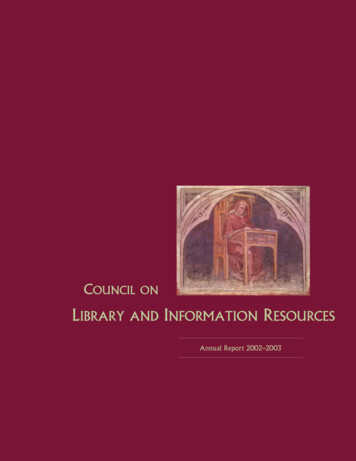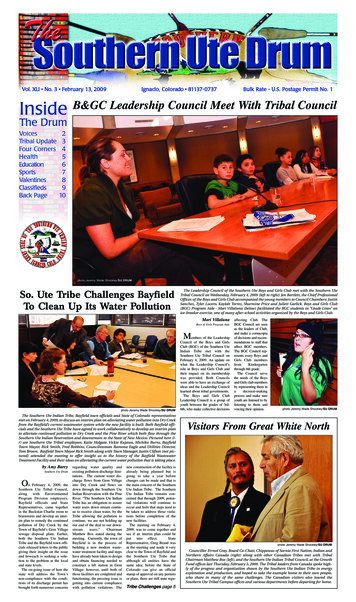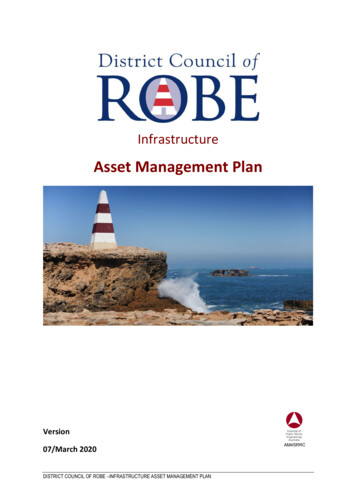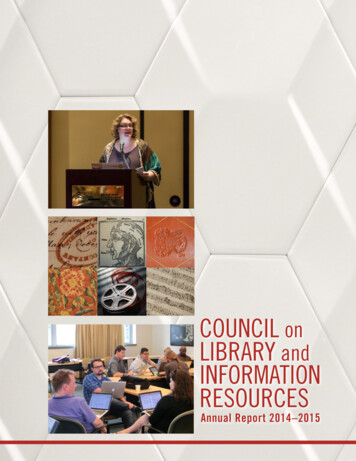
Transcription
COUNCIL onLIBRARY andINFORMATIONRESOURCESAnnual Report 2014–2015
COUNCIL onLIBRARY andINFORMATIONRESOURCESAnnual Report 2014–2015ContentsAcknowledgments. 2Directors, Staff, and Distinguished Presidential Fellows. 4Letter from the President. 5Programs and Activities. 9Fellows . 20Advisory Groups. 22Financial Statements. 24The Council on Library and Information Resources (CLIR) is an independent, nonprofit organization thatforges strategies to enhance research, teaching, and learning environments in collaboration with libraries, culturalinstitutions, and communities of higher learning. CLIR aspires to transform the information landscape to support theadvancement of knowledge.CLIR promotes forward-looking collaborative solutions that transcend disciplinary, institutional, professional, andgeographic boundaries in support of the public good. In pursuing its mission, CLIR is committed to building trust,retaining independence, fostering collaboration, cultivating effective leadership, and capitalizing on strategicopportunities.CLIR ANNUAL REPORT 2014–20151
ACKNOWLEDGMENTSThe following institutions and individuals provide crucial support for the activities andprograms of the Council on Library and Information Resources (as of June 30, 2015).CLIR SponsorsAlexander Street PressAllegheny CollegeAmerican UniversityAmherst CollegeArizona State University LibrariesAtlanta University CenterAuburn University LibraryBates CollegeBaylor UniversityBerea CollegeBinghamton UniversityBoston CollegeBowdoin CollegeBrigham Young UniversityBrillBrown University LibraryBryn Mawr College LibrariesBucknell UniversityCalifornia Digital LibraryCalifornia Institute of TechnologyCalifornia Lutheran UniversityCalifornia Polytechnic State UniversityCarleton CollegeCarnegie Mellon UniversityCarthage CollegeThe Catholic University of AmericaThe Claremont CollegesThe Clark Art InstituteCoalition for Networked InformationColby CollegeColgate UniversityCollege of CharlestonCollege of the Holy CrossColumbia UniversityConnecticut CollegeCornell University LibrariesDartmouth CollegeDenison UniversityDickinson College LibraryDuke UniversityEarlham CollegeEmory UniversityFolger Shakespeare LibraryFranklin & Marshall CollegeFurman UniversityGeorgetown UniversityThe George Washington UniversityGeorgia Institute of TechnologyGoucher CollegeGrinnell CollegeHamilton CollegeHarvard UniversityHaverford CollegeIndiana UniversityIowa State UniversityJohns Hopkins University LibrariesKenyon CollegeLafayette CollegeLake Forest CollegeLaval University LibraryLehigh UniversityLibrary of CongressLinfield CollegeLuther CollegeMarquette UniversityMassachusetts Institute of TechnologyMcMaster UniversityMiami UniversityMiddlebury CollegeMiddle Tennessee State UniversityMississippi State University LibrariesMontana State UniversityMount Holyoke CollegeNational Library of MedicineThe New York Public LibraryNew York UniversityNorth Carolina State University LibrariesNortheastern UniversityNorthwestern University LibrariesOccidental CollegeThe Ohio State UniversityOregon State University LibrariesPacific Lutheran UniversityPennsylvania State UniversityPepperdine UniversityPreservation TechnologiesPrinceton University LibraryPurdue University CalumetPurdue University LibraryReed CollegeRhodes CollegeRice UniversityRutgers, the state university ofNew JerseySaint Lawrence UniversitySewanee: The University of the SouthSkidmore CollegeSmith CollegeSmithsonian InstitutionSouthern Methodist UniversitySouthwestern UniversityStanford UniversitySt. Olaf CollegeStony Brook University LibrariesSwarthmore CollegeSyracuse UniversityTemple University LibraryTexas A&M University LibrariesTexas Tech UniversityTrinity UniversityTufts UniversityTulane UniversityUnion CollegeThe University of Alabama LibrariesUniversity at Albany, SUNYUniversity of AlbertaUniversity of Arizona LibraryUniversity of ArkansasUniversity of British ColumbiaUniversity of California, BerkeleyUniversity of California, IrvineUniversity of California, Los AngelesUniversity of California, San DiegoLibrariesUniversity of California, Santa BarbaraUniversity of Chicago LibraryUniversity of CincinnatiUniversity of Colorado at BoulderUniversity of Delaware LibraryUniversity of DenverUniversity of Florida LibrariesUniversity of Georgia LibrariesUniversity of GuelphUniversity of HoustonUniversity of Illinois at UrbanaChampaignUniversity of Illinois, ChicagoUniversity of Iowa LibrariesUniversity of KansasUniversity of Kentucky LibrariesUniversity of Maryland at College ParkUniversity of Massachusetts LibrariesUniversity of MiamiUniversity of MichiganUniversity of Minnesota LibrariesUniversity of Missouri LibraryUniversity of Nebraska-LincolnUniversity of North Carolina atChapel HillUniversity of North Carolina at CharlotteUniversity of North TexasUniversity of Notre DameCLIR ANNUAL REPORT 2014–20152
CLIR Sponsors (continued)University of Oklahoma LibrariesUniversity of OregonUniversity of OttawaUniversity of PennsylvaniaUniversity of PittsburghUniversity of Puget SoundUniversity of RichmondUniversity of RochesterUniversity of San FranciscoUniversity of South CarolinaUniversity of South FloridaUniversity of Southern CaliforniaUniversity of St. ThomasUniversity of TennesseeUniversity of Texas at ArlingtonUniversity of Texas at AustinUniversity of Toronto LibraryUniversity of UtahUniversity of VictoriaUniversity of VirginiaUniversity of WashingtonUniversity of Wisconsin-MadisonUniversity of WyomingUrsinus CollegeVanderbilt UniversityVassar College LibrariesVillanova UniversityVirginia Polytechnic Institute andState UniversityWashington and Lee University LibraryWashington University LibrariesWellesley CollegeWesleyan UniversityWest Virginia University LibrariesWhitman CollegeWilliams College LibrariesYale UniversityAmherst CollegeDLF Members (as of June 30, 2015)Arizona State University LibrariesAtlanta University CenterBates CollegeBaylor UniversityBibliotheca AlexandrinaBrown UniversityBryn Mawr CollegeBucknell UniversityCalifornia Digital LibraryCalifornia Institute of TechnologyCalifornia State University, ChannelIslandsCarnegie Mellon UniversityClemson UniversityCoalition for Networked InformationColby CollegeColgate UniversityColumbia UniversityCornell UniversityDartmouth CollegeDuke UniversityEmory UniversityFlorida State UniversityFurman UniversityGeorgetown UniversityGeorge Washington UniversityGeorgia Institute of TechnologyGeorgia State UniversityGetty Research InstituteHarvard UniversityHaverford CollegeIndiana UniversityJohns Hopkins UniversityThe Joint Information Systems CommitteeLafayette CollegeLibrary of CongressLos Alamos National LaboratoryResearch LibraryMacalaster CollegeMassachusetts Institute of TechnologyMcGill UniversityMcMaster UniversityMetropolitan New York Library CouncilMiddle Tennessee State UniversityMontana State UniversityNational Archives and RecordsAdministrationNational Library of MedicineNew York Public LibraryNew York UniversityNorth Carolina State University LibrariesNortheastern UniversityNorthwestern University LibraryOCLC ResearchThe Ohio State UniversityOregon State UniversityPennsylvania State University,University LibrariesPrinceton Theological SeminaryPrinceton University LibraryPurdue UniversityReed CollegeRhodes CollegeRice UniversitySmithsonian Institution LibrariesStanford UniversityStony Brook University LibrariesSwarthmore CollegeTemple UniversityTexas A & M UniversityTrinity UniversityUniversity of AlabamaUniversity of Albany, SUNYUniversity of AlbertaUniversity of ArizonaThe University of British ColumbiaUniversity of California, BerkeleyUniversity of California, IrvineUniversity of California, Los AngelesUniversity of California, RiversideUniversity of California, San DiegoUniversity of Chicago LibraryUniversity of DelawareUniversity of FloridaUniversity of GeorgiaUniversity of HoustonUniversity of Illinois at UrbanaChampaignUniversity of IowaUniversity of KansasUniversity of KentuckyUniversity of MarylandUniversity of MiamiUniversity of MichiganUniversity of MinnesotaUniversity of Nebraska, LincolnUniversity of North Carolina atChapel HillUniversity of North TexasUniversity of Notre DameUniversity of PennsylvaniaUniversity of RichmondUniversity of Southern CaliforniaUniversity of TennesseeUniversity of Texas at ArlingtonUniversity of Texas at AustinUniversity of UtahUniversity of VirginiaUniversity of WashingtonUniversity of Wisconsin-MadisonUniversity of WyomingVassar CollegeVirginia Polytechnic Institute andState UniversityWashington and Lee University LibraryWashington University in St. LouisWest Virginia UniversityYale University LibraryFoundation, Institutional, and IndividualSupport (as of June 30, 2015)The Alfred P. Sloan FoundationThe Andrew W. Mellon FoundationDavid RumseyEDUCAUSEHoward and Mathilde RovelstadInstitute of Museum and Library ServicesLibrary of CongressSamuel H. Kress FoundationCLIR ANNUAL REPORT 2014–20153
Directors July 1, 2014–June 30, 2015Dan CohenDigital Public Library of AmericaJames HiltonUniversity of MichiganWinston TabbThe Johns Hopkins UniversityPaul CourantUniversity of MichiganMichael A. KellerStanford UniversityJohn VaughnAssociation of American UniversitiesKurt De BelderLeiden UniversityAnne R. KenneyCornell UniversityLeslie WeirUniversity of OttawaMark DimunationLibrary of CongressW. Joseph (Joey) KingNational Institute for Technology inLiberal EducationDaniel WeissHaverford CollegeDarby English***Clark Art InstituteKathleen FitzpatrickModern Language AssociationDavid GiftMichigan State UniversityEmilie GordenkerRoyal Picture Gallery MauritshuisCharles HenryCouncil on Library and InformationResourcesMax MarmorSamuel H. Kress FoundationGene WiemersBates CollegeKarin Wittenborg**University of VirginiaHerman PabbruweBrill* Elected May 2015** Term concluded November 2014*** Term concluded May 2015Ingrid Parent*University of British ColumbiaStephen Rhind-TuttAlexander Street PressDavid RumseyCartography Associates, andDavid Rumsey Map CollectionStaff as of June 30, 2015Lizzi AlbertAdministrative CoordinatorSharon Ivy WeissChief Operating OfficerBethany NowviskieDirector, Digital Library FederationAlice BishopSenior Program OfficerLouisa KwasigrochDirector of Development and OutreachKathlin SmithDirector of CommunicationsNicole FerraioloProgram Officer for Scholarly ResourcesAdam Leader-SmithProgram AssociateChrista WillifordDirector of Research and AssessmentCharles HenryPresidentAmy LuckoDirector of Program AdministrationDistinguished Presidential FellowsMichael EdsonSmithsonian InstitutionElliott ShoreAssociation of Research LibrariesStephen G. NicholsJohns Hopkins UniversityJohn UnsworthBrandeis UniversityCLIR ANNUAL REPORT 2014–20154
LETTER fromthe PRESIDENTAnother productive, celebratory year for CLIR: the Council continues to flourish, expand its membership, and integrate withprograms, projects, and issues of international reach.Charles HenryPresidentProminent new staff appointments this year include Bethany Nowviskie,who arrived in April as the director of the Digital Library Federation(DLF), and Nikki Ferraiolo, program officer for scholarly resources.Bethany brings a wealth of scholarship, teaching, and mentoring skills toDLF and CLIR. Her work at the Scholar’s Lab at the University of Virginia,her leadership in the international flourishing of digital humanities overthe past decade and the increasing awareness of this field of research asintegral to the evolution of the grand tradition of humanistic inquiry, andher foundational role promoting the concept and beneficial consequencesof alternative careers in the academy will strengthen the mission of DLFand attract an ever-widening constituency.Nikki brings program and research expertise from her work at Columbia,both as a masters’ student and as program manager in the history department. She joined CLIR just before the launch of the new digitizing hidden collections program and has brought great energy and intelligence tothe effort in its first year. She was also a key organizing force behind theHidden Collections Symposium—the capstone event for the seven-yearcataloging program—in March 2015.The appointment in June 2014 of Michael Edson, director of web and newmedia strategy at the Smithsonian Institution, as CLIR DistinguishedPresidential Fellow also marks an important augmentation to CLIR’s mission. Michael is widely recognized as an articulate futurist who exploresthe potential of technology for museums and archives as a means to betterunderstand our growing dependence on visual culture. Michael’s visionis ably expressed in a proposal he brought to CLIR this spring: Openlab, aproject that will serve as instigator, incubator, and digital studio to accelerate the adoption of technologies and best practices across libraries, galleries, archives, and museums to catalyze sector-wide change.CLIR ANNUAL REPORT 2014–20155
This year also marked the publication of well-received research studiesand reports. Two epitomize the range of CLIR’s purview. The ARSC Guideto Audio Preservation was commissioned in response to the severe risk ofmedia deterioration and the limited funding to address this crisis. Theguide is a practical introduction to caring for and preserving audio collections. It is aimed at individuals and institutions that have recorded soundcollections but lack the expertise in one or more areas to preserve them.The Changing Landscape of Library and Information Services: What Presidents,Provosts, and Finance Officers Need to Know is a report that elaborates upona productive meeting of CLIR’s CIOs in which key contemporary issuesand challenges in library and technology services were enumerated.CLIR received several important grants this year; of particular note wasthe generous support from The Andrew W. Mellon Foundation for theDigitization of Hidden Special Collections and Archives. This grant inaugurates the new iteration of the national competition begun with the Cataloging Hidden Special Collections and Archives program. Our digitizationprogram aspires to encourage approaches to digitization that make possible new kinds of scholarship in the digital research environment; support the digitization of entire collections; promote strategic partnerships;promote best practices for ensuring the long-term availability and discoverability of digital content; and ensure that digitized content is madeavailable to the public as easily and completely as possible. In addition toproducing a wealth of digital objects of great cultural value, a salient goalis to facilitate the adoption of standards and best practices that will resultin a coherent, sustainable academic digital library of unprecedented scope.New to this year’s annual report is the category of Affiliates. We are usingthe term in a general way, to indicate a close programmatic alliance orassociation—a working relationship with many possible characteristics.The organizations listed bring to CLIR a variety of mutually beneficial opportunities. For example, NITLE is a program temporarily housed withinCLIR as we work with its constituency to determine the services andresources that would help reinvigorate the institution; NITLE may remaina part of CLIR if its members so recommend. The International Interoperable Image Framework (IIIF) is an affiliate by virtue of our promotionalsupport of the framework, our assistance with administering finances, andour mentoring of staff IIIF plans to hire in the coming years. These andother organizations that joined us subsequent to June 2015, including theNational Digital Stewardship Alliance (NDSA) and the iSchool Consortium, offer a rich diversity of perspectives and interests while at the sametime collectively strengthening our mission: collaborating with libraries, cultural institutions, and communities of higher learning to enhanceresearch, teaching, and learning.CLIR ANNUAL REPORT 2014–20156
It is, as always, a privilege to work with the exceptionally talented staff atCLIR and our supportive Board of Directors. Many who are new to CLIRor know us by the volume of projects and research we produce believethe organization is three or four times its actual size; this is a tribute to thework capacity and dedication of our exemplary team.Next year marks the 60th anniversary of CLIR: an opportunity to reflectupon decades of achievements and contributions to higher education andour role in promoting the public good of shared, open information. Withthe ongoing support of our sponsors and members, this landmark anniversary will be memorable as well as a pivot to further substantive workin realizing a vision as succinct as it is powerful: to transform the information landscape to support the advancement of knowledge.Charles HenryPresidentDecember 2015CLIR ANNUAL REPORT 2014–20157
416 peopleattended the 2014DLF Forum 4 milliongranted in theHidden CollectionsprogramCLIR’SREACHthis yearOver 200 CLIRsponsors and DLFmembers36 attended the2015 LeadingChange Institute inWashington, DC15 MellonDissertationFellowshipsawarded42 PostdoctoralFellows receivedgrantsFour reports,numerous blog posts,and 6 newsletterspublishedCLIR ANNUAL REPORT 2014–20158
PROGRAMSand ACTIVITIESJuly 1, 2014–June 30, 2015DIGITAL INFRASTRUCTUREObjective: Promote research, skill development, and collaboration to strengthen thedigital infrastructure supporting all facets of the scholarly communication cycle.Digital Library FederationProgramStrategy meets practiceat the Digital LibraryFederation (DLF).Through its programs,working groups, andinitiatives, DLF connects CLIR’s visionand research agendato an active network ofpractitioners working indigital libraries, archives,labs, and museums. DLF is a place where ideas can be road-tested, andfrom which new strategic directions can emerge.The Digital Library Federation is a robust and diverse community of practitioners who advance research, learning, and the public good through thecreative design and wise application of digital library technologies. DLFserves as a resource and catalyst for collaboration among archives, libraries and library service organizations, publishers, labs, museums, professional organizations, vendors, and all who are invested in digital libraryissues. The organization promotes work on standards and best practices;research and data management across disciplines; aggregation and preservation services for digital collections; digital library assessment; and services that expand access to resources for research, teaching, and learning.In April 2015, Bethany Nowviskie became director of the DLF, succeedingRachel Frick, who left the organization in September 2014. Widely knownCLIR ANNUAL REPORT 2014–20159
as a pioneer and leading force in the digital humanities, Nowviskie hadbeen a distinguished presidential fellow at CLIR, president of the Association for Computers and the Humanities, and director of the internationally-known Scholars’ Lab at the University of Virginia Library. Among hergoals for the coming year at DLF are increasing support for DLF’s working groups, improving communications and the organization’s web presence, deepening programmatic ties between DLF and CLIR, strengtheningDLF’s connections with the national and international digital stewardship community, continuing to build a vibrant liberal arts colleges cohortwithin the DLF, and exploring intersections between digital library andmuseums practice.DLF Forum. The DLF Forum is convened annually and is open to digitallibrary practitioners from member institutions and the broader community. The Forum serves as a meeting place, marketplace, and congress.As a meeting place it provides an opportunity for DLF working groups,affiliated organizations, and community members to conduct business andpresent their work. As a marketplace of ideas, the Forumprovides an opportunity to disseminate experiences anddevelop best practices, and to support a broader level ofinformation sharing among digital library professionals.As a congress, the Forum provides an opportunity for theDLF to continually review and assess its programs withinput from the community at large.The 2014 DLF Forum, held October 27–29 in Atlanta,Georgia, drew a record 416 participants. Many of the sessions, including keynote addresses presented by BethanyNowviskie and Bonnie Tijerina, were livestreamed andare available through the DLF website. In addition, aseries of blog posts, contributed by recipients of DLF NewProfessionals Fellowships, DLF Forum Fellowships forUnderrepresented Groups, and DLF Cross-Pollinator Awards, providepersonal perspectives on the Forum. Affiliated events included the AdaInitiative’s Allies Workshop and the Taiga Forum.Present at the 2014 Forum were representatives of several liberal artscolleges, and liberal arts college representation in the DLF communitycontinues to grow. To better serve this community, in February 2015 DLFannounced that it would host a Liberal Arts Colleges Preconference, preceding the 2015 Forum in Vancouver.The 2014 Forum also welcomed four highly accomplished museum practitioners, thanks to generous support from the Samuel H. Kress Foundationfor a new program for Museum Cross-Pollinator Fellows. Fellows eachCLIR ANNUAL REPORT 2014–201510
shared reflections in a series of blog posts after the Forum, often highlighting the goals and challenges libraries and museums have in common.Digital Library Assessment. A new and highly active DLF Digital LibraryAssessment group was formed in 2014. This group plans to meet in personduring the DLF Forum to share problems, ideas, and solutions, and workyear-round through a dedicated email list and a DLF-supported wiki.Membership is open to anyone interested in learning about or collaborating on the improvement of digital library assessment measures. Currentsubcommittees are focusing on tools and best-practices documents tosupport cost assessment, to measure digital library analytics, to standardize digital library content citations, and to assess user needs and usability.White papers and other work products will be made available throughoutthe year.DLF eResearch NetworkThe DLF eResearch Network (eRN), created in2014, is a cohort-based learning and networking experience meant to help academic andresearch libraries devise collaborative strategies for data management support. eResearchNetwork members develop plans appropriatefor their institutions through collaboration,resource sharing, webinars, and custom consultations by eRN faculty. Network memberscome from colleges and universities of varying size. To date, 13 institutions from across the United States and Canada have participated in theeRN.Institutional Participants 2014 and2015, DLF eResearch NetworkCalifornia Institute of TechnologyColgate UniversityMontana State UniversityNorthwestern UniversityTemple UniversityUniversity of ArizonaUniversity of FloridaUniversity of Illinois atUrbana-ChampaignUniversity of ManitobaUniversity of Nevada Las VegasUniversity of RichmondUniversity of RochesterUniversity of TorontoThe 2014 eRN cohort concluded its work in November 2014. Over thecourse of the six month program, 24 participants from 8 institutions developed data management surveys, identified and filled needs for repository software, conducted outreach with local scholars and administrators,and piloted educational workshops. Participants consistently emphasizethe value of peer-to-peer interaction in the eRN. “The DLF eRN faculty,fellows, and peers gave us valuable feedback on the current state of ourresearch data services, and based on the eRN experience, we are movingforward with a data management needs assessment and a data repositorypilot,” said Mayu Ishida, research services librarian at the University ofManitoba. Together with fellow 2014 eRN participant Kathleen Fear, datalibrarian at the University of Rochester, Ishida led a panel on “The Role ofAssessment in Research Data Services” at the Research Data Access andPreservation (RDAP) summit in 2015.The 2015 DLF eRN cohort kicked off with an in-person meeting in April,CLIR ANNUAL REPORT 2014–201511
co-located with the RDAP summit in Minneapolis. Work is expected toconclude with a meeting at the 2015 DLF Forum in Vancouver.Digitizing Special Formats Wiki. The Digital Library Federation is nowcurating a list of resources for professionals planning projects involvingthe digitization of rare and unique materials. The list may be of specialinterest to CLIR Hidden Collections applicants and grantees, and includesintroductory and reference materials that are good places to begin exploring issues relevant to digitizing cultural heritage.Study on Needs in Continuing Education for Managing Cultural Heritage DataIn September 2013, the Institute of Museum and Library Services (IMLS)awarded CLIR a grant to examine federally mandated plans for openaccess and their implications for continuing education needs for libraries, museums, and other cultural heritage institutions. Under this grant,CLIR is conducting research in three areas. Part 1 is a highly structuredcontent analysis of select federal agency plans for supporting open accessto data and publications, identifying the commonalities and differencesamong the plans with emphasis on access to data. Part 2 takes the resultsof the content analysis and traces its implications for IMLS program areasand the cultural heritage institutions they serve. Part 3 identifies gaps incontinuing education opportunities for cultural heritage professionals,assessing the readiness of the current professional workforce and identifying how best to address the needs and close the gaps in the immediate andlonger term. Final results will be released in spring 2016.Committee on Coherence at ScaleCLIR established the Committee on Coherence at Scale for Higher Education in October 2012, in partnership with Vanderbilt University. Thecommittee’s charge is to examine emerging national-scale digital projectsand their potential to help transform higher education in terms of scholarlyproductivity, teaching, cost-efficiency, and sustainability. The Committee currently comprises 24 members, representing university and collegepresidents and provosts, heads of national education associations and otherorganizations, and library and i-school deans. The Committee meets twiceyearly.In spring 2015, the University of Pittsburgh’s iSchool announced the firsttwo iFellows under the new doctoral fellowship program for informationscience students that support research for the Committee on Coherenceat Scale. Timothy Schultz, PhD student at Drexel University’s iSchool,and Wei Jeng, PhD student at the University of Pittsburgh’s iSchool, wereselected from a competitive pool of applicants. Timothy Schultz’s researchwill dive into the world of “big data” as it pertains to collaborating, visualizing, and sharing information in the medical industry. Wei Jeng’s researchCLIR ANNUAL REPORT 2014–201512
will focus on her interest in information sharing, with an emphasis oninvestigating how scholars communicate and share research data with oneanother. The program, funded by an award from The Andrew W. MellonFoundation, will ultimately support 10 iFellows in total.SCHOLARSHIP and RESEARCHObjective: Explore and assess new research methodologies, emerging fields ofinquiry, intellectual strategies involving data gathering and collaboration, andmodes of communication, including sharing of research data and publishing models, that are likely to define the next generation of scholars.Postdoctoral Fellowship ProgramCLIR’s Postdoctoral Fellowship Program offers recent PhD graduatesan opportunity to work on projects that forge and strengthen connections among library collections, educational technologies, and currentresearch. Launched in 2004, the program has supported 130 fellows at 60host institutions across the United States and Canada.Since 2012, in response to a growing recognition within the professionalcommunity that research data management posed particular challengesto libraries and other departments serving today’s researchers, CLIRexpanded the program’s focus to data curation. With grant supportfrom the Alfred P. Sloan and Andrew W. Mellon Foundations, CLIRseeks to help host institutions establish staffing models, policies,resources, and services related to research data curation throughmatching those institutions with PhDs with expertise relevant totheir needs.In May 2015, CLIR announced the award of 14 postdoctoral fellowships: five Postdoctoral Fellowships in Academic Libraries, fiveCLIR/DLF Postdoctoral Fellowships in Data Curation for VisualStudies, and four CLIR/DLF Postdoctoral Fellowships in Data Curation for the Sciences and Social Sciences.Click to see a snapshot of CLIR Postdoctoral Fellowshipsin Data CurationThe Fellowships in Data Curation for Visual Studies were launched thisyear with funding from The Andrew W. Mellon Foundation. As a field, Visual Studies calls attention to the material, cultural, and historical contextsof all images, the relationship of the visual object to the viewer, and the actof seeing from a historical and cultural perspective. Scholars in this fieldanalyze and interpret static images, as well as film and video resources,including oral histories, performance, art, and mass media. Through thisprogram, CLIR/DLF seeks to raise awareness and bu
Stony Brook University Libraries Swarthmore College Syracuse University Temple University Library Texas A&M University Libraries Texas Tech University Trinity University Tufts University Tulane University Union College The University of Alabama Libraries University at Albany, SUNY University of Alberta University of Arizona Library University .


